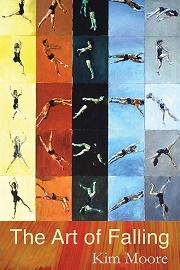Review of The Art of Falling by Kim Moore (Seren 2015)

This is a debut collection, uneven but with plenty of vim and interest in its language and concerns. The mid-section is the one most obviously themed, concerning a violent and abusive relationship; the other two sections are more disparate, though the third contains several poems either "after" named people or titled for them.
In her best poems, she assembles objects and events with a sure sense of their significance – in "I'm Thinking of my Father" a man haunted by his brother's impending death feeds a fire obsessively:
             and he doesn't care about splinters
or safety, as long as the fire gets higher.
All the stone lions and grave little gnomes
in their cheerful red breeches are waiting
and the lamp that's addicted to heat
flickers on, flickers off, and the lawn sits
in its shadows and dark and its falsehood
and the ending begins with its terrible face
Another impressive poem is "Red Man's Way", its language apparently uncomplicated but working, with its rhythms, perfectly:
             I feel full,
as if one person can't carry this with them
and be unchanged, as if I could speak seagull
and they would come cursing, articulate,
their wings the colour of sky.
The whole of the second section is powerful, finding some telling images for the relationship - "The World's Smallest Man", in which the speaker imagines the "you" figure smaller and smaller, until the poem ends in a finely achieved ambiguity:
till you are less than a grain of salt
so small, you are living on my skin.
And once I breathe, I breathe you in.
And in "Body, Remember" she takes the Cavafy poem where he urges his body to recall both the pleasures it has known and all those it hasn't, but she uses it inventively by having her speaker, instead, resolve to remember the feel of danger.
I said it was uneven and there are certainly individual poems that fall below par, notably "Tuesday at Wetherspoons", where apparently "all the men have comb-overs,/bellies like cakes just baked" – what, all? That's just lazy stereotyping. But what worries me a little more is a rhetorical technique, which thanks to contact with some recent A-level students, I now know is called anaphora: the repetition of a word or phrase at the start of every sentence or new proposition. For instance, in "When I was A Thing With Feathers" the operative word, which defines all the syntax, is "when":
when feathers pierced my skin growing from within,
when I tried to let my head fall to my hands and found
only wings, when I was able to fly
In other poems, words like "and", "this", "by", or phrases like "some people", fulfil the same semantic function. Now there's nothing wrong with this in any individual instance, but by my count about a third of the poems use this device, and then it starts looking less like a rhetorical device and more like a method of composition. Again, we all have ways of coming by a poem, and this one can be as good as any, but when used too often it can start to look like an exercise. It's awfully easy for poets to develop tics, to get into habits of automatically using the same ways of working, and then they need to steer clear of the comfort zone for a while. I don't think any of the poems I most admired in the collection used this technique, but that might be partly because after the third or fourth time it cropped up, it was feeling predictable.
But the main impression the collection left with me was of language used with considerable skill and power, and often also surprise. Those who think the "myth-kitty" outmoded and unusable might care to reflect on how it is renewed in "Translation":
Don't we all have a little Echo in us, our voices stolen,
only able to repeat what has already been said:
you made me do it, he says, and we call back do it, do it.
Published on May 17, 2015 05:20
No comments have been added yet.



